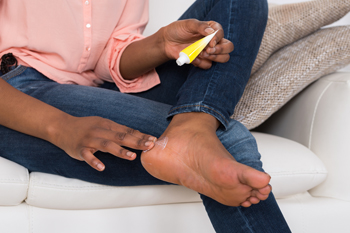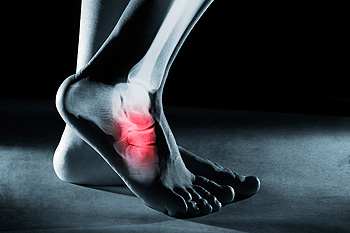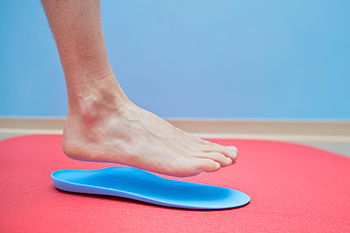Items filtered by date: October 2022
Cracked Heels and Vitamins

Cracked heels, also known as heel fissures, is a specific kind of foot condition that is characterized by extremely dry skin on the back of the heels. There are many causes of cracked heels, including eczema, athlete’s foot, and aging. However, there is another often overlooked potential cause of cracked heels that is known as a vitamin deficiency. Certain essential vitamins can ultimately keep your skin healthy, preventing them from flaking and cracking. Just some of these essential vitamins include vitamin E, vitamin B-3, and vitamin C. All of these aforementioned vitamins keep the skin around the heels well-nourished. If you have heel fissures and suspect that it might be due to some kind of vitamin deficiency, contact a podiatrist today for treatment.
Cracked heels are unsightly and can cause further damage to your shoes and feet. If you have any concerns, contact one of our podiatrists from PA Foot & Ankle Associates. Our doctors can provide the care you need to keep you pain-free and on your feet.
Cracked Heels
Cracked heels appear unappealing and can make it harder for you walk around in sandals. Aside from looking unpleasant, cracked heels can also tear stockings, socks, and wear out your shoes. There are several methods to help restore a cracked heel and prevent further damage.
How Do You Get Them?
Dry skin is the number one culprit in creating cracked heels. Many athletes, walkers, joggers, and even swimmers suffer from cracked heels. Age and skin oil production play a role to getting cracked heels as well.
Promote Healing
Over the counter medicines can help, especially for those that need instant relief or who suffer from chronic dry feet.
Wear Socks – Wearing socks with medicated creams helps lock in moisture.
Moisturizers – Applying both day and night will help alleviate dryness which causes cracking.
Pumice Stones – These exfoliate and remove dead skin, which allows for smoother moisturizer application and better absorption into the skin.
Change in Diet
Eating healthy with a well-balanced diet will give the skin a fresh and radiant look. Your body responds to the kinds of food you ingest. Omega-3 fatty acids and zinc supplements can also revitalize skin tissue.
Most importantly, seek professional help if unsure how to proceed in treating cracked heels. A podiatrist will help you with any questions or information needed.
If you have any questions, please feel free to contact one of our offices located in Allentown, Easton, Northampton, and Chew Street in Allentown, PA . We offer the newest diagnostic and treatment technologies for all your foot care needs.
Don't Ignore a Stress Fracture

A stress fracture happens as a result of repetitive use of the feet and can occur from excessive running, walking, or participating in jumping activities. Pain and discomfort often accompany a stress fracture and it can be common for it to be ignored. Many people feel uncomfortable giving up exercising because of a stress fracture, despite knowing that this is temporarily the best thing that can be done to ensure proper healing. There are alternatives to exercises that many people have found to be enjoyable, in addition to maintaining cardiovascular health. These include swimming, cycling, and water aerobics. Additionally, patients can opt to use a stationary bike that has no impact on the feet. It is beneficial to treat a stress fracture by frequently elevating the affected foot and wearing a protective boot can provide adequate stability as well. If you have developed a stress fracture in your foot, please contact a podiatrist for effective relief methods.
Activities where too much pressure is put on the feet can cause stress fractures. To learn more, contact one of our podiatrists from PA Foot & Ankle Associates. Our doctors can provide the care you need to keep your pain free and on your feet.
Dealing with Stress Fractures of the Foot and Ankle
Stress fractures occur in the foot and ankle when muscles in these areas weaken from too much or too little use. The feet and ankles then lose support when walking or running from the impact of the ground. Since there is no protection, the bones receive the full impact of each step. Stress on the feet can cause cracks to form in the bones, thus creating stress fractures.
What Are Stress Fractures?
Stress fractures occur frequently in individuals whose daily activities cause great impact on the feet and ankles. Stress factors are most common among:
- Runners
- People affected with Osteoporosis
- Tennis or basketball players
- Gymnasts
- High impact workouts
Symptoms
Pain from the fractures occur in the area of the fractures and can be constant or intermittent. It will often cause sharp or dull pain with swelling and tenderness. Engaging in any kind of activity which involves high impact will aggravate pain.
If you have any questions please feel free to contact one of our offices located in Allentown, Easton, Northampton, and Chew Street in Allentown, PA . We offer the newest diagnostic and treatment technologies for all your foot and ankle needs.
Plantar Warts Can Be Treated!
Reasons That Foot Pain Occurs

Many people experience foot pain at some point in their lives, and it may become worse while walking. A common condition that patients are affected by is known as plantar fasciitis. The pain from this ailment is often felt in the heel and arch area and comes from inflammation of the plantar fascia. The pain may be worse upon arising in the morning and may improve as the day progresses. There is another painful foot condition that is referred to as Morton’s neuroma and this affects the nerve between the third and fourth toes. It often happens as a result of wearing shoes that do not have enough room for the toes to move freely in and can compress the nerves. The pain may be diminished when custom-made orthotics are worn, and in severe cases, surgery may be recommended. An injury to the Achilles tendon may cause tendonitis to develop, which generally causes severe pain and discomfort. This can occur from increasing speed and distance too quickly while running, possibly causing the tendon to rupture. If you have foot pain for any reason, it is strongly advised that you seek the counsel of a podiatrist who can help you with effective treatment methods so you can resume painless everyday living.
Foot Pain
Foot pain can be extremely painful and debilitating. If you have a foot pain, consult with one of our podiatrists from PA Foot & Ankle Associates. Our doctors will assess your condition and provide you with quality foot and ankle treatment.
Causes
Foot pain is a very broad condition that could be caused by one or more ailments. The most common include:
- Bunions
- Hammertoes
- Plantar Fasciitis
- Bone Spurs
- Corns
- Tarsal Tunnel Syndrome
- Ingrown Toenails
- Arthritis (such as Gout, Rheumatoid, and Osteoarthritis)
- Flat Feet
- Injury (from stress fractures, broken toe, foot, ankle, Achilles tendon ruptures, and sprains)
- And more
Diagnosis
To figure out the cause of foot pain, podiatrists utilize several different methods. This can range from simple visual inspections and sensation tests to X-rays and MRI scans. Prior medical history, family medical history, and any recent physical traumatic events will all be taken into consideration for a proper diagnosis.
Treatment
Treatment depends upon the cause of the foot pain. Whether it is resting, staying off the foot, or having surgery; podiatrists have a number of treatment options available for foot pain.
If you have any questions, please feel free to contact one of our offices located in Allentown, Easton, Northampton, and Chew Street in Allentown, PA . We offer the newest diagnostic and treatment technologies for all your foot care needs.
Two Categories of Orthotics

Orthotics are insoles that fit into the shoe. Custom-made orthotics are specifically designed to the individual patient and foot condition and can be a successful method in reducing or eliminating foot pain. Wearing orthotics may help to restore ankle function, in addition to correcting foot deformities, such as flat feet. Many patients who have bunions, hammertoes, arthritis, or diabetes may benefit from wearing orthotics as part of their treatment plan. There are two types of orthotics, rigid and accommodative. The latter type is flexible and cushioned, while plastic materials are used to construct rigid orthotics. The process of having custom-made orthotics begins by having a mold made of the patient’s feet, while considering their footwear needs. If you have a foot condition that may be helped by wearing orthotics, please contact a podiatrist who can determine if this is the best decision for you.
If you are having discomfort in your feet and would like to try orthotics, contact one of our podiatrists from PA Foot & Ankle Associates. Our doctors can provide the care you need to keep you pain-free and on your feet.
What Are Orthotics?
Orthotics are inserts you can place into your shoes to help with a variety of foot problems such as flat feet or foot pain. Orthotics provide relief and comfort for minor foot and heel pain but can’t correct serious biomechanical problems in your feet.
Over-the-Counter Inserts
Orthotics come in a wide variety of over-the-counter inserts that are used to treat foot pain, heel pain, and minor problems. For example, arch supports can be inserted into your shoes to help correct overarched or flat feet, while gel insoles are often used because they provide comfort and relief from foot and heel pain by alleviating pressure.
Prescription Orthotics
If over-the-counter inserts don’t work for you or if you have a more severe foot concern, it is possible to have your podiatrist prescribe custom orthotics. These high-quality inserts are designed to treat problems such as abnormal motion, plantar fasciitis, and severe forms of heel pain. They can even be used to help patients suffering from diabetes by treating foot ulcers and painful calluses and are usually molded to your feet individually, which allows them to provide full support and comfort.
If you are experiencing minor to severe foot or heel pain, it’s recommended to speak with your podiatrist about the possibilities of using orthotics. A podiatrist can determine which type of orthotic is right for you and allow you to take the first steps towards being pain-free.
If you have any questions please contact one of our offices located in Allentown, Easton, Northampton, and Chew Street in Allentown, PA . We offer the newest diagnostic and treatment technologies for all your foot and ankle needs.

